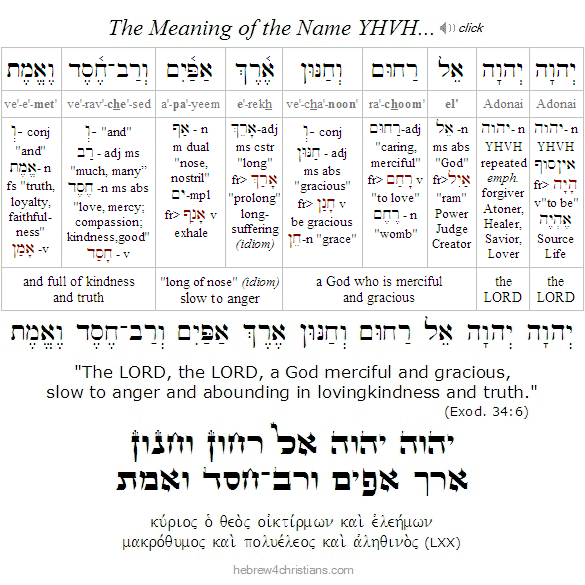|
If you can't detect God's hand in your circumstances, then trust His heart... The heart of faith affirms: gam zu l'tovah (גַּם זוּ לְטוֹבָה): "this too is for good," particularly when the present hour may be shrouded in darkness... Whenever I am confused about life (which is often enough), I try to remember what God said to Moses after the tragic sin of the Golden Calf: "I will make all my goodness pass before you and will proclaim before you my Name, 'The LORD' (יהוה). And I will be gracious to whom I will be gracious, and will show mercy on whom I will show mercy" (Exod. 33:19). God's character does not change: the LORD is the same "yesterday, today, and forever." The meaning of the Name, however, cannot be known apart from understanding the need of the heart:
יְהוָה יְהוָה אֵל רַחוּם וְחַנּוּן
אֶרֶךְ אַפַּיִם וְרַב־חֶסֶד וֶאֱמֶת
Adonai · Adonai · El · ra·choom · ve·cha·noon
e'·rekh · a·pa'·yeem · ve·rav-che'·sed · ve·e·met

"The LORD, the LORD, a God merciful and gracious,
slow to anger, and abounding in lovingkindness and truth."
(Exod. 34:6)
Download Study Card


Earlier God had revealed to Moses that the Name YHVH (יהוה) means: "He is Present" (i.e., the word is a play on the Hebrew verb hayah [הָיָה], "to be"), and therefore God is "always there" (Exod. 3:14). The great I AM (אֶהְיֶה) means God stands outside of the constraints of time, "one day is as a thousand years" and "a thousand years as one day" before Him (2 Pet. 3:8). Just as a thousand years is but "a watch in the night" (Psalm 90:4), so one day is as a thousand years. God's Spirit broods over all things and sustains the entire universe. God is "necessary being," the Source of Life, and foundation for all other existence. God's creative love and power sustain all things in creation...
Now while the idea that God is the Source of all life in the universe is surely important, it is not entirely comforting, especially in light of man's guilt and anxiety over death. After all, we do not stand before the "god of the philosophers," but rather the personal God of Abraham, Isaac, and Jacob. The meaning of the Name YHVH - that He is merciful, gracious, slow to anger, abounding in love and truth, and so on - therefore presents additional revelation in face of man's inherent brokenness and spiritual need. Some things in life are only known in the passion of faith... things like love, beauty, honor, and so on. The Name of the LORD as the Compassionate One is only known in humility, when all human pretense is stripped away and the inner life is laid bare in its desperate need. The Name YHVH is God's response to the heart's cry for deliverance, for compassion, for mercy....
What is God like - what is His heart - is the first question, and how we answer that will determine how we deal with all the other questions that come up in theology... What do you feel inside when you stare up at the ceiling before you go to bed? In light of the ambiguity and heartaches of life we might wonder if God is there for us. Does God care? Is He angry at me? Does He really love me? This is the raw place of faith, where we live in the midst of our questions. The Name YHVH means "He is present," even when we are unconscious of His Presence in the hour of our greatest need.
The legalist is actually enslaved to the idea of God's conditional acceptance: "If you obey, then you belong." There is still some faith that the right religious scruples, the affirmation of a particular creed, and the practice of certain rituals will gain us access to His heart. The message of the cross scandalizes the religious because it boldly states, "if you believe, then you belong." As Kierkegaard rightly observed, "And this is the simple truth - that to live is to feel oneself lost. He who accepts it has already begun to find himself, to be on firm ground. Instinctively, as do the shipwrecked, he will look around for something to which to cling, and that tragic, ruthless glance, absolutely sincere, because it is a question of his salvation, will cause him to bring order into the chaos of his life. These are the only genuine ideas; the ideas of the shipwrecked. All the rest is rhetoric, posturing, farce." For Kierkegaard, religious rituals devoid of a sense of crisis within the heart are little more than a sham. "I think of the times I tried to use him to make my life secure, and undisturbed, and painless. Also the times I was enslaved by fear of him, and by the need to protect myself against him through rites and circumstances" (de Mello). Ritualistic behavior is a vacuous substitute for trusting that His heart is forever present for you.
|




